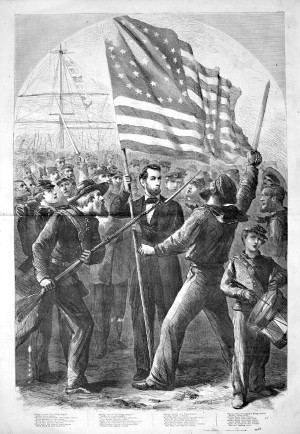The health of the city “is improving and the general health may now be considered good.” During the winter, there was “a large amount of sickness” — congestion, spotted fever, and small-pox — some fatal. Prevalent now, mostly among the soldiers in the camps, is typhoid pneumonia and inflammatory rheumatism. A “nice lot of lumber” became available when the frame Arsenal buildings, located east of the city, were sold at public auction for a bargain $1,200 (2013: $17,632.23). The sale was in preparation for the construction of the new Arsenal buildings to be built this summer by Messrs. Kirchner and Robinson. The plan calls for buildings of “permanence and durability” with walls made from “the fine blue limestone of Jennings County.” When completed, the Arsenal buildings “will be among the most handsome structures in the West.” With the successful invasion of western Kentucky by rebel cavalry, the Indiana Legion was ordered to be ready “to take to the field at an hour’s notice” if Indiana is threatened with another raid “like that of Morgan’s.” The City Regiment was put upon a war footing.
The entire Union ticket was successful in the Center Township election following the tabulation of a light vote. If all of the recent real estate “speculations” are realized, Circle Street may one day present a “wreath of beautiful buildings.” However, it is hoped that before “this marble circle is completed,” the City Fathers will boulder the street “to rescue us from this unfathomable mud-hole.” In the southern part of the city with all of its factories and shops running at full capacity, on every street a number of improvements have commenced. Particularly on Meridian Street once all of the work is done, it “will be one of the most compact and best built up streets in the city.” Contracts have been let for the “long-talked of street railways.” The local firm of Cox, Lord & Peck has commenced the work of casting the “frogs” and curves; Coburn & Jones will furnish the stringers and crossties. Work on the streets will commence in June after the arrival of iron and spikes from the East. Gas posts, lamps and fixtures continue to be erected in various parts of Indianapolis so that by this summer the city will be generally lighted. The “beautiful” historic musical drama Rob Roy delighted a large audience at the Metropolitan Theater, and later in the month the exciting great national military drama Bull Run was presented to a standing room only house.
A stampede of 320 horses along East Washington Street was “both exciting and amusing” to behold. The animals were being taken to the depot where they were to board a train for the government’s St. Louis General Depot for Condemned or Rejected Horses. As these horses raced down the street, some of them believed scarcely able to go “galloped all the way to White River,” other horses on the street stopped, and instead of becoming frightened, looked on in apparent wonderment. A number of books, magazines, newspapers, etc. have been accumulated for the library at the Soldiers’ Home that will help to “render endurable, and even pleasant, the weary hours of convalescence.” Indiana newspapers published a notice by William Hannaman, general military agent of Indiana, asking the legal heirs of 112 Hoosier soldiers who died on board the floating hospital Nashville to claim their effects. About a dozen distressed looking refugees (fugitives from starvation) — men, women, and children — from East Tennessee came through the depot seeking a place to stay in the North.
A parade of the colored battalion through the city attracted “much attention.” The soldiers “bear themselves as men who have rights and dare to maintain them.” They will soon leave for the field under the leadership of Captain Charles S. Russell who is “quite popular.” “RALLY ROUND THE FLAG, BOYS, RALLY ONCE AGAIN!” — Gov. Morton issued a call for 20,000 “one hundred day” volunteers, and Colonel Samuel C. Vance ordered the City Regiment to assemble at University Park “to decide as to offering their services.” A War Meeting at Masonic Hall was “large and enthusiastic beyond expectation.” Mayor John Caven issued a proclamation calling upon the city’s business men to close their places of business at noon on Wednesday, April 27 and devote the afternoon to “raising the quota of troops.” A parade of the Veteran Reserve Corps, the Cavalry, and the City Regiment “was the grandest and most imposing” in the city since 1861. Many of “our patriotic ladies…have determined to volunteer in the service” by taking the places of clerks and others “who would cheerfully go, but whose business cannot be suspended.” Some employers have agreed to pay one half salaries and reserve the positions of clerks who join for hundred days’ service.
James Melville’s Australian Circus — Equestrians, Gymnasts, Acrobats, Clowns, Comedians, Equilibrists, Contortionists, and General Performers — entertained the residents of the Hoosier capital on the last two days of the month.



